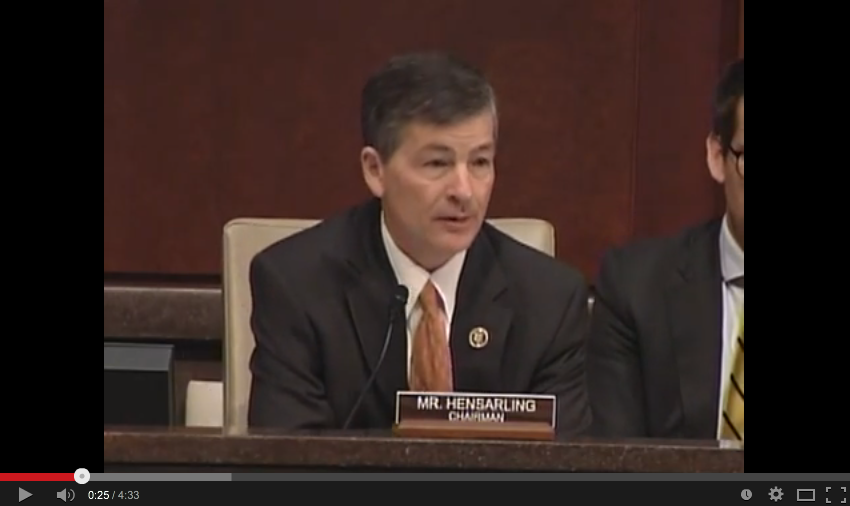 |
| CLICK HERE TO WATCH |
Financial Services Committee Chairman Jeb Hensarling (R-TX) delivered the following opening statement at today’s full committee hearing to examine the regulatory burden facing community banks and credit unions and the detrimental effect this burden has on consumers:
I would say of all the priorities of our committee I know of not one that is more urgent than providing some regulatory relief for our community financial institutions. It is not an exaggeration to say that they are literally withering on the vine. We are losing more than one a day and they are not perishing of natural causes. The sheer weight, volume, cost, complexity and uncertainty of federal regulation is a burden that is killing them off. And as they die, unfortunately, so do the dreams of millions and millions of our fellow citizens, hardworking taxpayers, who rely upon these community financial institutions to help buy a pickup truck to to drive to work, maybe help fund the first kid in their family to ever to go to college, to start a small business and achieve their American dream of financial independence.
It’s not an exaggeration to say that every single week we hear from another financial institution that is having trouble meeting the needs of their customers. I have one message here from a bank in Arkansas that says due to the Qualified Mortgage rule that they have had to cease funding mobile homes “which have long been a source of homeownership for low to moderate income consumers in our markets.” Here is one from a credit union in California who says due to federal regulation that one of their members can no longer wire funds to a family member in Ukraine. Here is one from a bank in Massachusetts -- “we have experienced a spike in loan declines to women” for their investigation identified that women attempting to buy the family home to settle their divorce and stabilize their family were being declined at a high rate due to the Dodd-Frank Qualified Mortgage rules and the ability to pay rules.
Regrettably, these are not exceptions. We hear from these banks and credit unions every day and we understand how federal regulation can adversely impact low and moderate income Americans.
Now some, particularly those on the other side of the Capitol, have said community financial institutions are doing just fine. In fact they have said“regulators have done a pretty good job protecting community banks.” I suspect many of our witnesses will disagree with their statement. I believe that assertion is just wrong, dangerously wrong and out of touch with low and moderate income Americans.
Much, but certainly not all, of this regulatory burden has emanated from Dodd-Frank. I am not a fan of Dodd-Frank but even I can find some good in it. What Dodd-Frank attempted to do on 13(3) of the Fed, what it’s done to help eliminate the credit rating agencies’ monopoly, what it’s done to make balance sheets less opaque. So if I can find some good in it I hope my friends on the other side of the aisle can admit it has done some harm. I know Barney Frank has found at least half a dozen different areas where we he would amend his own law. He said it right before us back in July.
And so I would ask all of my Democratic colleagues to have an open mind as we enter into this and I invite all Members to engage in in the bipartisan effort of regulatory relief for our community financial institutions and find some common ground. I will reserve the right to have an exception to the rule but the rule is going to be any Member who brings a legitimate, bipartisan piece of legislation to provide needed regulatory relief to community financial institutions, we will mark it up. Time is of the essence; let’s get started.